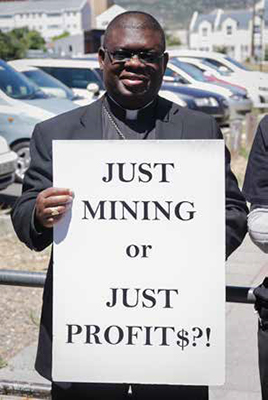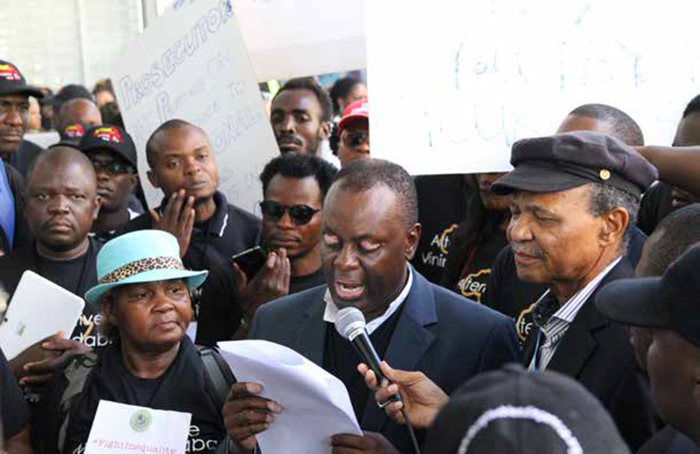
WHY: Local communities are often victims of negative effects of mining, and do not benefit from mineral extraction. Faith institutions have the advantage of being some of the most trusted institutions in Southern Africa with authority and outreach at local as well as national level. Faith leaders are well placed to support affected communities and at the same time address the rights-holders’ needs and views to legal and corporate duty-bearers.
WHAT: As part of the Resource Governance programme faith leaders in a number of NCA programme countries have been capacitated and mobilised to engage in issues related to extraction of minerals and natural resource management. In 2016 there are several examples of how faith leaders have accompanied mining affected communities in their struggle for justice by using their legitimacy to create safe spaces for engaging mining companies and legal dutybearers to deliver on human rights.

In October 2016, the Government of Botswana announced the abrupt closure of its largest copper and nickel producer, BCL mine in Selebi- Phikwe. The mine had been in operation since 1972 and employed 4,850 people. According to the Botswana mining law the government is expected to consult the workers and counsel them through a step-by-step process towards final closure of a mine. However, in this case the government made a sudden public announcement at a local stadium and several employees were sent home the same day, before the end of their shift. NCA’s partner, Botswana Council of Churches (BCC), was the first organisation to respond to the mining community’s crisis. In the days after the announcement, BCC formed and led a task force providing psychosocial support and counselling for the affected employees and their families.
BCC also brokered a dialogue between the community, the local mining union, church leadership and the local government authorities, including the mayor of Selebi-Pikhwe, to seek common solutions. In order to assess the immediate and long-term effects of the mine closure, and to recommend measures to mitigate these, BCC also documented stories of the affected and researched the socioeconomic impacts of the closure. They also assessed policies against practice and their review, The Application of Mine Closure in Botswana, concluded that the closure of the BCL mine violated all but one of the World Bank’s standards for mine closures, as described in the Environmental and Safety Guideline for Mining. BCC was able to take this leading role as they, supported by NCA, have built their competency and positioned themselves over years as the main civil society reference point for extractive industries and resource governance issues in Botswana. NCA introduced BCC to the Alternative Mining Indaba (AMI) model in 2012 and have since arranged this event gathering affected communities, faith groups, civil society and government officials on an annual basis.

Closing a mine is a sensitive and at times dangerous process, as the mining site has to be secured properly to avoid damage to people and the environment. In general, shutting down a mine sustainably takes between two and ten years, but in Mwawulambo in Karonga district, Malawi, the Norwegian owned mining company, Eland Coal, shut down their mine in 2015 leaving behind piles of coal and open pits filled with contaminated water. According to the Malawian Mines and Minerals Bill the company is obliged to rehabilitate the area when terminating an intervention; an obligation the company has note yet fulfilled. In 2016, NCA’s partner in Karonga; Church and Society of Livingstonia Synod, mobilised community members in Mwaulambo and organised a demonstration to put pressure on the government to take action in assisting community members in accessing justice. The community demanded that the government hold Eland Mine accountable to their responsibilities to refill the deadly trenches it left in the community. Government officials were pressured to come and assess the damage done and have since responded to the community demands. Since Eland coalmine has Norwegian investors, NCA head office also tried to access the Norwegian owners, but so far there has been no response.
Faith leaders also took action in Tanzania to claim the rights of mining affected communities. In Mkomang’ombe Village in Ludewa District, community members were not permitted to farm on their land, but did not get any compensation from the Chinese coal company which had claimed the area for mining operations. In 2009, NCA’s partner Tanzania Episcopal Conference (TEC) formed a district interfaith committee (DIC) in Ludewa, consisting of six faith leaders from different faiths. With NCA support, TEC has strengthened the faith leaders’ capacity on issues of natural resource governance, human rights and budget monitoring. In 2016 they arranged a series of meetings between the affected community members and the village leaders and district council, to peacefully claim the villagers’ rights to compensation. As a result, the District Commissioner agreed to work on the complaints raised by Mkomang’ombe’s residents. When the Prime Minister Hon. Majaliwa Kassimu Majaliwa visited Ludewa District, one of the issues he raised was the grievances from the Mkomang’ombe community. The Prime Minister also ordered the valuation to be revisited and just compensation to be paid to the villagers as early as possible. If it had not been for the faith leaders’ engagement and pressure on the district council, the Prime Minister would not have heard about the community’s claims.
RESULTS: Faith leaders have supported affected mining communities and created safe spaces for dialogue between rights-holders and dutybearers. The faith leaders have added authority to the mining affected communities’ claims towards legal duty-bearers and mining companies.